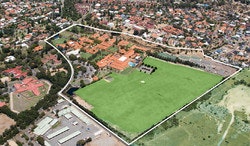Year 12 Mathematics Essential General
This is a General course which focuses on using mathematics effectively, efficiently and critically to make informed decisions. It provides students with the mathematical knowledge, skills and understanding to solve problems in real contexts for a range of workplace, personal, further learning and community settings. This course provides the opportunity for students to prepare for post-school options of employment and further training.
Unit 3
This unit includes the following four topics: measurement; scales, plans and models; graphs in practical situations; and data collection.
This unit provides students with the mathematical skills and understanding to solve problems related to measurement, scales, plans and models, drawing and interpreting graphs and data collection. Students use the mathematical thinking process and apply the statistical investigation process. Teachers are encouraged to apply the content of the four topics in this unit: Measurement; Scales, plans and models; Graphs in practical situations; and Data collection, in a context which is meaningful and of interest to the students. A variety of approaches could be used to achieve this purpose. Possible contexts for this unit are Construction and design, and Medicine.
It is assumed that an extensive range of technological applications and techniques will be used in teaching this unit. The ability to choose when, and when not, to use some form of technology, and the ability to work flexibly with technology, are important skills.
The number formats for the unit are positive and negative numbers, decimals, fractions, percentages, rates, ratios, square and cubic numbers written with powers and square roots.
Unit 4
This unit includes the following three topics: probability and relative frequencies; earth geometry and time zones; and loans and compound interest.
This unit provides students with the mathematical skills and understanding to solve problems related to probability, earth geometry and time zones, loans and compound interest. Students use the mathematical thinking process and apply the statistical investigation process to solve problems involving probability. Teachers are advised to apply the content of the three topics in this unit: Probability and relative frequencies; Earth geometry and time zones; and Loans and compound interest, in a context which is meaningful and of interest to the students. Possible contexts for this unit are Finance, and Travel.
It is assumed that an extensive range of technological applications and techniques will be used in teaching this unit. The ability to choose when, and when not, to use some form of technology, and the ability to work flexibly with technology, are important skills.
The number formats for the unit are positive and negative numbers, decimals, fractions, percentages, rates, ratios and numbers expressed with integer powers.
ASSESSMENTS
Assessment will include practical applications and statistical investigation process: 45% | tests: 40% | externally set task: 15%.
REPORTING
A brief interim report on class work and behaviour will be issued towards the end of Term 1. The achievement for the course will be reported as a College A - E grade as well as a percentage mark for the course and an examination mark for both Semester 1 and the year. In addition, the student's approach to class work and behaviour will be reported via the usual key performance indicators.
STUDENT EXPECTATIONS
Students are expected to:
- bring the required text, calculator and stationery to each lesson
- complete regular homework from a variety of sources including the text, worksheets and Mathletics
- be aware of assessment dates and have prepared thoroughly for each assessment
- be proactive in seeking help from the teacher when required.
